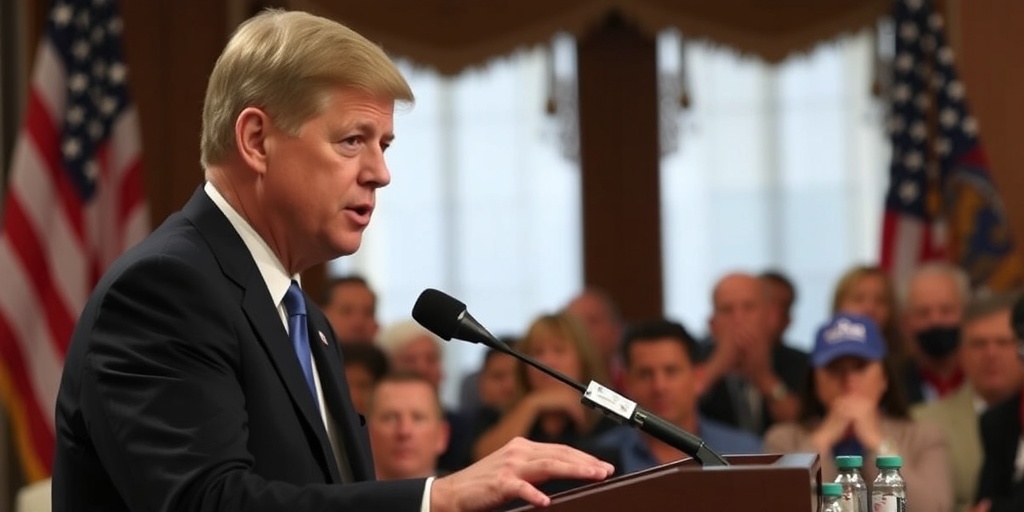Now Reading: Trump Administration Ordered to Reinstate 6,000 Agriculture Dept. Employees
-
01
Trump Administration Ordered to Reinstate 6,000 Agriculture Dept. Employees
Trump Administration Ordered to Reinstate 6,000 Agriculture Dept. Employees

Title: Federal Board Orders Reinstatement of Thousands of Agriculture Department Employees Following Mass Firings
In a significant ruling on Wednesday, the Merit Systems Protection Board mandated that thousands of Agriculture Department employees, who were recently dismissed, must be reinstated to their former positions for a minimum of 45 days. This order affects an estimated 5,000 to 6,000 probationary employees, all of whom were terminated during a period marked by the Trump administration’s aggressive efforts to downsize the federal workforce, particularly targeting newer employees with lower job protections.
Probationary employees, who are often new to their roles, have fewer civil service protections compared to more tenured government workers. The current administration has viewed these employees as easier to dismiss, a sentiment echoed by both President Trump and tech mogul Elon Musk, who spearheaded drastic workforce reductions in various agencies. While the administration’s goal was to streamline government operations, the firings raised concerns regarding adherence to established personnel practices.
Among the rules that must be followed when dismissing probationary employees are requirements for managers to document specific performance issues that justify such actions. The chair of the Merit Systems Protection Board, Cathy Harris, expressed during her order of reinstatement that she had "reasonable grounds" to believe that the dismissals violated legal guidelines concerning proper personnel management.
The immediate implications of this ruling are confined to those employees at the Agriculture Department who were fired on February 13. The agency has yet to comment on the board’s decisions or the next steps regarding the reinstated employees. Moreover, the ruling could pave the way for other probationary workers dismissed from different agencies to seek similar relief if adequate evidence is presented by the Office of Special Counsel, which initiated the appeal based on allegations of wrongful terminations.
Hampton Dellinger, the special counsel representing the employees, indicated that the evidence gathered thus far suggests that the firings at the Agriculture Department were not anomalies. In an interview, he remarked, “Based on the evidence I’ve seen so far, there is nothing unique or singular or atypical about the firing of the U.S.D.A. employees,” implying that a broader trend of unlawful dismissals could be uncovered.
The investigation began when affected employees approached Dellinger’s office, which falls under an independent agency tasked with addressing whistleblower complaints and wrongful dismissals. Recognizing the potential for significant violations of employee rights, Dellinger presented the case to the Merit Systems Protection Board, requesting a halt to the firings for further investigative proceedings.
However, as the investigation unfolded, it became apparent that Dellinger, in turn, faced challenges to his own position. After previously being dismissed by the Trump administration, he successfully contested this termination in federal court and was provisionally reinstated. Nevertheless, the administration is currently appealing this court decision, raising the specter of potential instability in his position as he navigates these turbulent proceedings.
The evolving situation took another turn on Wednesday when a panel of appellate judges lifted the suspension on Dellinger’s dismissal, effectively sidelining him until the court hears the ongoing appeals. This development leaves uncertainty regarding the future of the ongoing investigations into mass firings across various federal agencies.
The strategy employed by the Trump administration, which interpreted directives to streamline government operations as a mandate to dismiss probationary workers, has alarmed many observers. Accounts suggest that more than 20,000 probationary employees, including veterans, have been terminated under these guidelines, with agencies interpreting such directives as encouragement to reduce their staffing levels.
Despite the current turmoil surrounding the firings, the Merit Systems Protection Board’s order raises hopes for affected employees across the federal landscape. Legal experts have signaled that this ruling may set a precedent for other allegations of wrongful terminations. Michelle Bercovici, a lawyer with the Alden Law Group, highlighted that her firm had previously filed complaints regarding the firings to the Office of Special Counsel, indicating a potential ripple effect of this case.
Among those affected is Jacob Bushno, who was terminated despite receiving a positive performance evaluation and nearing completion of his first year with the U.S. Forest Service. Reaching out to his former supervisor for clarity on the reinstatement order, Bushno learned that there was still uncertainty about the process going forward.
Max Stier, president of the Partnership for Public Service, emphasized the need for careful management in addressing workforce reductions. He characterized the targeting of probationary employees as “low-hanging fruit,” criticizing the administration’s edge toward rapid action that ultimately led to numerous mistakes.
As the situation evolves, the reinstatement of the probationary employees is just one aspect of a broader debate about the rights of federal workers and the ongoing impact of significant personnel changes within government agencies. The fallout from these firings, along with ongoing investigations, will likely redefine the landscape for federal employment in the months ahead.
Stay Informed With the Latest & Most Important News
Previous Post
Next Post
-
 01New technology breakthrough has everyone talking right now
01New technology breakthrough has everyone talking right now -
 02Unbelievable life hack everyone needs to try today
02Unbelievable life hack everyone needs to try today -
 03Fascinating discovery found buried deep beneath the ocean
03Fascinating discovery found buried deep beneath the ocean -
 04Man invents genius device that solves everyday problems
04Man invents genius device that solves everyday problems -
 05Shocking discovery that changes what we know forever
05Shocking discovery that changes what we know forever -
 06Internet goes wild over celebrity’s unexpected fashion choice
06Internet goes wild over celebrity’s unexpected fashion choice -
 07Rare animal sighting stuns scientists and wildlife lovers
07Rare animal sighting stuns scientists and wildlife lovers





















